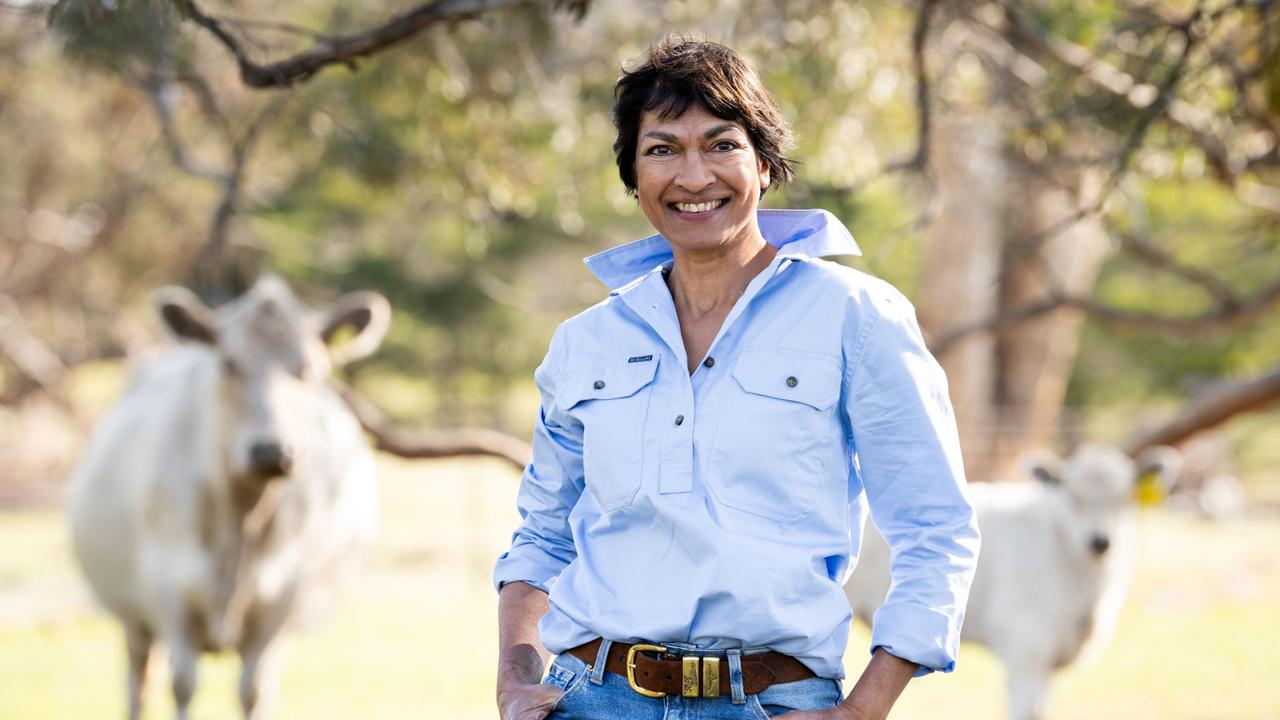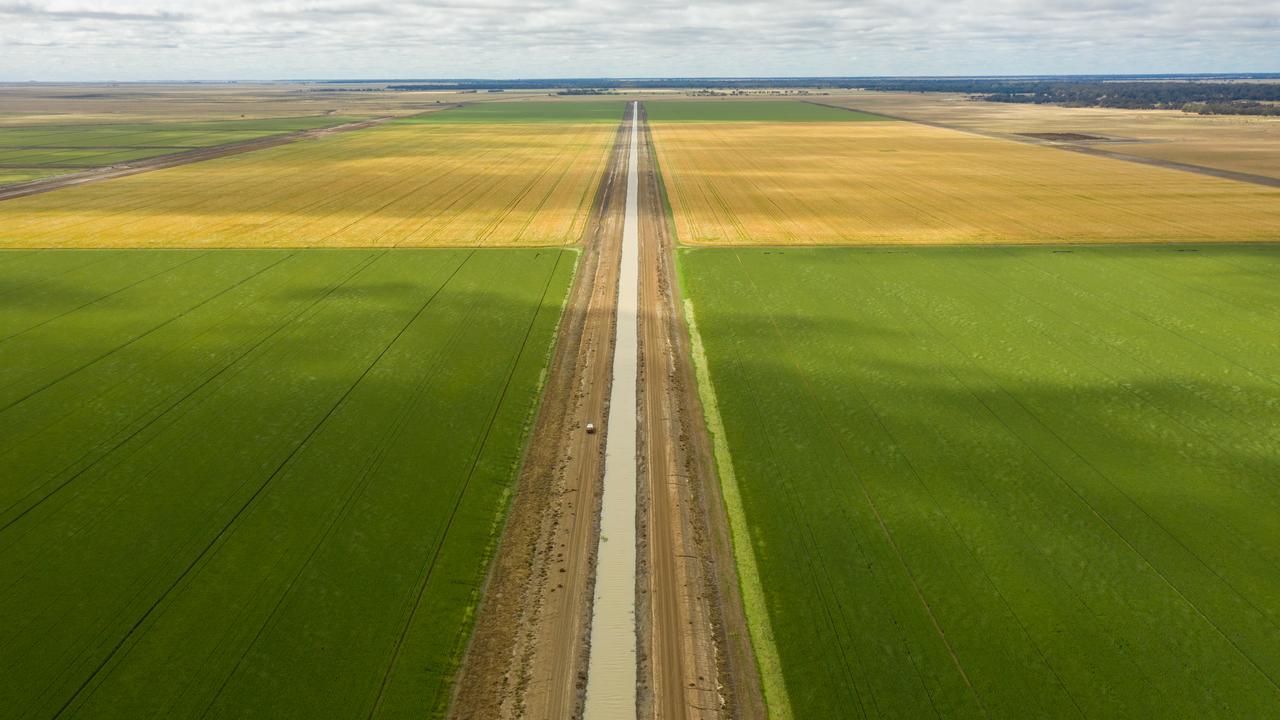Anthony Di Pietro: Inside produce powerhouse LaManna Premier Group
The head of the nation’s biggest national fresh fruit and vegetable supply businesses, Anthony Di Pietro, shares how LaManna became a powerhouse.
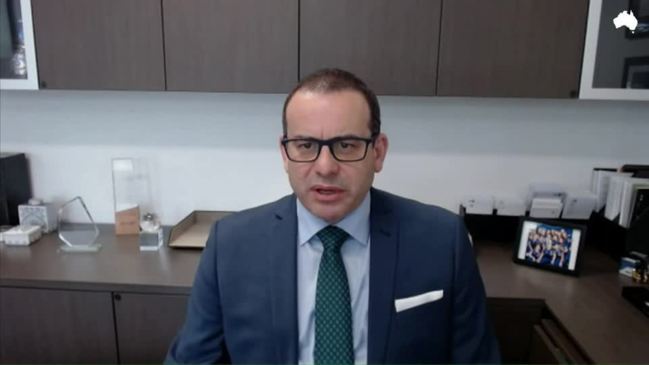
The past two years have been tough for Anthony Di Pietro, the self-effacing but powerful head of one of Australia’s biggest national fresh fruit and vegetable supply businesses, the LaManna Premier Group.
When the Covid-19 pandemic hit Australia in March last year, the $500 million company battled to get the massive amounts of fruit and vegetables it grows on its own farms across Australia – as well as the produce of another 1100 horticultural growers that supply it – to market.
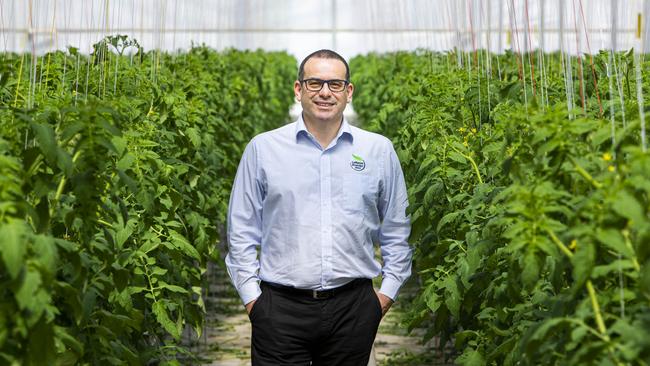
Closed borders, sick truckies, no restaurants, state lockdowns, disappearing foreign backpacker workers, and major supermarket distribution centres and wholesale markets shut down by positive Covid cases, created havoc in food supply chains.
For the LaManna Premier Group, Di Pietro and his team of 500 employees and another 500 contractors, it was like switching the critical produce business to a wartime footing.
From growing bananas in North Queensland and tomatoes in the Goulburn Valley to keeping oranges, watermelons, cucumbers and zucchinis on the shelves in Coles, Woolworths and Aldi, Covid-19 heralded in a hectic period when anything and everything about the way the business operated could, and did, change with just a few hours’ notice.
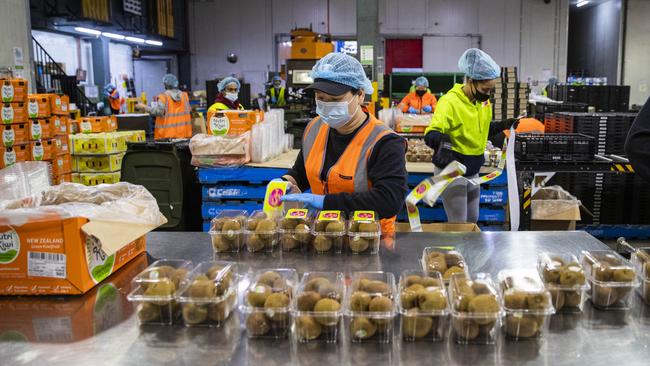
On one hand, demand for fresh Australian-grown fruit and vegetables had never been higher, with shortages exacerbated by panic buying leaving supermarket shelves bare.
But the food-service sector almost stopped buying fruit and vegetables overnight – just think of the lost smashed-avocado breakfast cafe market – eventually forcing many farmers to let unwanted fruit rot in the field or sell below cost.
Other growers, including the LaManna Premier Group, struggled to find enough workers to pick and pack their fruit and vegies.
The usually bustling fresh wholesale markets across Australia where the original Premier Fruits Group had its roots – Epping in Melbourne, Rocklea in Brisbane and Flemington in Sydney – were eerily quiet as local greengrocers lost business to online food shopping and restaurants stayed firmly shut.
But the deep-thinking Di Pietro, 52, perhaps best known as long-time chairman of the top A-League Melbourne Victory professional soccer club, stayed calm and cool as has become his trademark reaction. He knows from personal experience, that in both business and sport, things could always be worse.
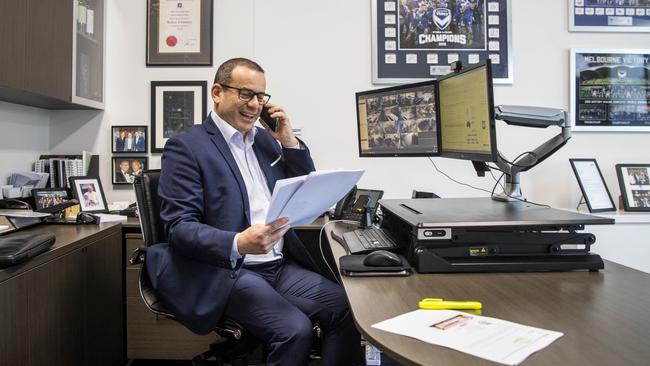
“My grandparents (Vince and Caterina) were vegetable growers in Buronga (near Mildura) on the banks of the Murray; it’s where my dad, Joe, grew up,” says dark-suited Di Pietro in his marble-floored Footscray office, as Melbourne prepares to slowly emerge from the coronavirus shadows.
“One of his four sisters drowned in the Murray when she was just 16; then in 1956 my grandparents’ farm was wiped out by floods.” (They never recovered.)
“To this day, if I have a bad day or week in the business I can’t go and cry on Dad’s shoulder, because he just says that it’s when you see your glasshouse washing down the main street of Mildura, then you know you’ve got a problem.”
In a twin run of recent trouble and bad luck for Di Pietro, the highly successful Melbourne Victory – which Di Pietro helped found and personally invests in as a 20 per cent major shareholder – had a shocker of a year during 2020-21.
The once-unbeatable A-League club lost key players and managers, Di Pietro was forced to sack the head coach after a catastrophic seven losses in a row, and a disgruntled fellow director sold his 10 per cent stake in the $45 million club and walked off the board. Victory ended up on the bottom of the ladder for the first time, a far cry from the triumph of 2015 when an ecstatic Di Pietro held the premiership cup high.
“I love it; I’m passionate about the game and the club,” says Melbourne-based Di Pietro, who has been Victory chairman since 2010. “It’s been a great journey with real highs and peaks; but winning the wooden spoon last year probably wasn’t one of them.”
Di Pietro has dealt with all the challenges thrown up by the pandemic in the same sanguine way.
“You just have to get on with it, work out your priorities and deal with the problems one by one,” he says. “But it has been a continual rolling challenge. Of course, the health and safety of everyone in our business and their families was our first priority, but then it was about business continuity and making sure our doors stayed open.
“If a company like ours shut down it would have a major impact on the supply chain and many people and communities; we grow and supply between 20 per cent of all bananas in Australia and a big proportion of the red round loose gourmet tomatoes that you see in every supermarket trolley, as well as have a critical role in the wholesale markets. We can’t just shut up shop.
“Our staff had to endure some really tough times; it was very challenging on the frontline because they were exposed to the risks at a time when none of us really knew how this thing was spread and they then had to go home to their families.”
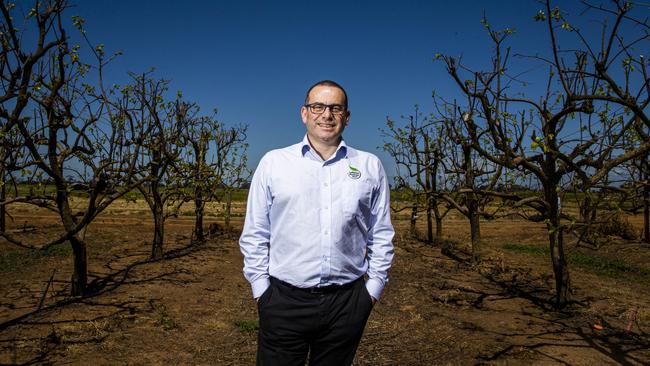
The worst of the crisis came when the operations of major distribution centres of both Coles and Woolworths in Melbourne, which LPG supplies with their daily fresh fruit and vegetable requirements for all supermarkets, were severely impacted with Covid-positive workers. Suddenly Di Pietro and his team had to organise truck deliveries of much smaller and specific orders of fresh produce direct to individual suburban supermarkets across the city.
“It’s been like a wartime footing for so long,” says a weary Di Pietro. “The shelves were empty of fresh fruit and vegetables and the supermarkets were waiting and we had to deliver; you certainly knew you were alive.”
It’s a long way from the shape of the business in 1990, when Di Pietro left university and, with his younger brother Frank, started working for his parents in their wholesale fresh produce business, Viva La Fruit, at the Footscray markets. It followed years spent learning the industry from their father.
In 1998, in a quest to expand and diversify, the Di Pietro family merged their business with Premier Fruits on the other side of the Footscray markets, run by first cousin Frank Brancatisano and passionate Camberwell greengrocer Joe Petroro.
“Frank Brancatisano and me and my brother had all grown up together, our mums were sisters,” Di Pietro says. “We thought it would be good for our regular buyers and customers if we could guarantee more choice of fruit and vegetable categories and year-round supply; the Brancatisano family were big in melons from Queensland while we were strong in buying from growers in Victoria and the Riverina.”
The next decade was a period of rapid growth and change for Premier Fruits. Father Joe retired and Frank Brancatisano sold his shares to Di Pietro, many smaller farmers quit growing fruit, and horticultural operations became bigger.
It soon became clear to Di Pietro the big two supermarket chains were fast tracking towards a national buying structure, and would only consider supply contracts with “aggregators” such as Premier Fruits Group.
A joint venture with the Queensland La Manna banana-growing family followed to secure West Australian business Fresh Choice, locking in watermelon, rockmelon and pumpkin growers.
At the same time, Premier established itself in wholesale markets in Brisbane and Sydney, set up a trading foothold in Adelaide, and by 2013 had a trading network across the nation. In parallel, Di Pietro also decided to re-enter direct farming, the first such venture since the disastrous 1956 Mildura floods ruined his grandparents.
“Dad was not keen; he always told me the quickest way to make a small fortune out of a big fortune was to invest in farming,” laughs Di Pietro. “Our aim is for all our farms to be profitable on their own. But Dad was right; that’s hard to do.”
Zucchini, capsicum, cucumber and tomato farms at Childers and Bundaberg, in Queensland, were bought first, with melons and pumpkins also grown in rotation. Then followed the purchase of Freshway Farms in South Australia near Murray Bridge, where tomatoes, capsicums and zucchinis were grown in big glasshouses.
“That proved to us the benefits of indoor farming at a time when we were still growing tomatoes out in the field and it was getting more difficult to meet the quality demands of consumers and the supermarkets,” Di Pietro says.
In 2014, Premier Fruits Group partnered with well-known Shepparton field tomato growers, the Mercuri family, and eventually bought 90 hectares from them at Lancaster to build their first state-of-the-art hydroponic greenhouse.
In July 2016, it merged with the LaManna Bananas empire – then the biggest banana growers in Australia based around Innisfail and Tully and with an identical national fruit and vegetable trading arm. The LaManna company had by then been 100 per cent acquired by 100-year-old New Zealand farmer cooperative, Market Gardeners NZ. The end result was the powerful new LaManna Premier Group, 70 per cent owned by MG NZ and its 250-member fruit and vegetable growers, and the other 30 per cent by Di Pietro, the LoGiudice and Petroro families – all original Premier Fruits Group shareholders – with Di Pietro the new entity’s chief executive.
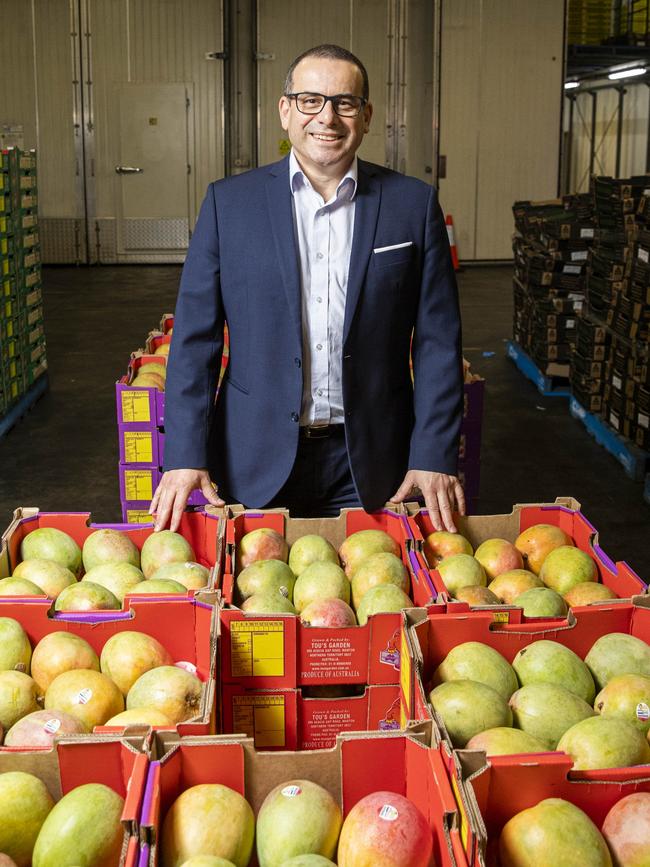
As current president of the Australian Fresh Produce Alliance, Di Pietro is keen to play a major part in the Australian horticultural sector’s rapid growth over the next decade.
Expectations are that the fruit and vegetable industry can double from a $10.5 billion turnover in 2019 to more than $20 billion by 2030, boosted by new export markets.
“The big superannuation and pensions funds, as well as corporate investors, from both Australia and overseas, are all interested in funding the expansion of covered horticulture because it offers much reduced risk compared to other agribusiness investments and opportunities,” Di Pietro says.
“But agriculture, and even covered horticulture, is a five, maybe 10-year cycle. I’ve had years, right on harvest, where our whole outdoor tomato crop at Shepparton was wiped out by a storm and it cost us millions, or we’ve lost an entire banana crop in cyclones. But there’s other years when farming is highly profitable.
It’s a long-term game and as an investor you have to have patience and deep pockets.”
Peter Hendry, chief executive of MG Marketing and LPG director, describes Di Pietro as one of the most professional operators in the Australasian fresh produce scene, with a thoroughness that more corporate bosses should emulate.
“The produce industry in Australia has evolved so quickly; the supermarkets here have a real focus on buying direct from growers and don’t want to deal with you as a wholesaler or aggregator unless you really add value or are a big grower in your own right too,” Hendry says.
“LPG needs those farms, that vertical integration, because if you don’t have produce it’s hard to be relevant with the supermarkets. But we also need good relations with the larger growers and corporate farmers who we buy from; Anthony’s long experience and relationships in the industry and family involvement is critical for that too.”
It’s the day before the AFL Grand Final in locked-down Melbourne and most of its long-suffering residents are out enjoying the public holiday, and obsessively talking of only one thing – the footy.
But for Anthony Di Pietro, Aussie Rules is not football.
Which is why we are visiting his company’s ambitious tomato farm near Shepparton – where LPG is growing more of its large round gourmet tomatoes hydroponically and under greenhouse cover every year – on a day when most of Victoria is talking about the Demons playing the Western Bulldogs.
But there is only one football code for Di Pietro – and has been since he was a young boy – soccer.
The leading businessman’s early fascination with the game began in 1974 – when he was just a five-year-old and his brother, Frank, was four – and the two boys were enrolled by their parents with the Peninsula Junior Soccer Club at Frankston, not far from their home on the market-gardening southern fringe of Melbourne at Cranbourne.
Since that early age, soccer has always been an essential part of Di Pietro’s life.
When he faced the harsh realisation in his late teens, that he would never be good enough to become a professional soccer player, a realistic reassessment of his future was required.
Quickly administration and being involved behind the scenes with the sport he loves, beckoned.
“That meant too that I could contribute to the community outside of our business (then Premier Fruits Group) which grew very quickly during the ’90s and early 2000s as Frank and I took over,” Di Pietro says.
“Then in 2004 when Melbourne Victory was formed, I took that involvement to another level.
“But, being part of such a great board (at Victory), really helped me with my business thinking … and how LPG has developed and grown too.”
The Victory board since its start read like a Who’s Who of Melbourne business – with many connections to both agribusiness and the fruit and vegetable sector.
Di Pietro credits Victory’s first chairman, founder and former Elders Resources chief executive Geoff Lord, as an inspirational leader, who set the culture and spirit of the club that Di Pietro was to eventually head when he was handed the chairmanship baton by Lord in 2010. But it was retailing giant Frank Lowy, chairman of the Football Federation Australia and founder of the professional A-League in Australia who “mesmerised” a youthful Di Pietro.
“He was a great leader,” Di Pietro says. “He demonstrated to me that, in business and in sport, sometimes being tough is required to get the right outcome.”
Other mentors and fellow Victory board members included Coles Group’s Scottish CEO Ian McLeod who is credited with doubling the supermarket chain’s profits and power, and returning it to profitability. A former CEO of the legendary Celtic soccer club in his native Scotland, McLeod changed the way Di Pietro approached and thought about people within his business. So too did the co-owner and co-founder of the Metricon Homes building behemoth, Mario Biasin, who along with Di Pietro sits on the Victory board and is the single biggest shareholder in the publicly-owned soccer club.
“Mario has been a significant business role model; working alongside him on the board at Victory as we developed it into a national football club taught me a lot about how to manage teams, processes and systems,” Di Pietro says.
Market Gardeners’ Peter Hendry was another mentor, along with Brian Gargiulo, chairman of the LaManna Premier Group since its merger.
“They inspired me to grow my people; it’s thanks to them that (LPG) now has its Growing You program that is all about promoting and encouraging the next generation in the business and giving them a feel for how the wheels turn right across the group,” Di Pietro says.
“Horticulture, especially being in fresh fruit and veg, is an unbelievable high-adrenaline industry with massive opportunities as the capital flows in and cutting-edge technology is introduced.
“But by and large the sector has generally done a terrible job at showing how much fun it can be and the real breadth and buzz it offers across so many areas from the growing of produce and agriculture to the trading floor.”
Mark LoGiudice, who heads his family’s property investment business, Crawfords Group, has known Di Pietro since the pair were 17-year-olds in the mid-1980s.
LoGiudice, president of the Carlton AFL Football Club for the past seven years until August, also sits on the board of the LaManna Premier Group in which his family began to invest back in 2006.
“Anthony had aspirations to take it national which required warehouses and coolrooms in every state; we decided not just to help build the warehouses but to become a shareholder too,” LoGiudice says.
Both LoGiudice and his close friend Di Pietro are now 52. Both have headed major businesses and sporting clubs, and are deeply involved in the LaManna Premier Group.
“We definitely pinch ourselves now and then because there is no way that it would have ever crossed our minds back when we were teenagers that we would both end up heading major sporting clubs like Carlton and Victory,” LoGiudice says. “We are good sounding boards for each other and we have both faced big challenges in our industries, and in our clubs, certainly in recent years. In the corporate world it’s too often about the “I”, and that’s not Anthony; I suspect he would hate being the centre of an article like this.” (He does.)
Next October, it will be 100 years since Anthony’s grandfather, another Anthony (Antonio) Di Pietro, first arrived in Australia from Italy’s north to start farming near Mildura.
The LPG boss likes to reflect how much times have changed in his industry, and in Australia.
When his grandfather and father farmed oranges and worked in the Footscray wholesale fruit markets, it was dominated by Italian and Greek families. Now in the LaManna Premier Group, staff are employed from every continent and more than 50 countries.
“We’re like a United Nations here, a real mix,” says Di Pietro. “It’s probably what I’m proudest of; together with helping turn a male-dominated industry into one with females now working across all parts of the business.
“I might be passionate about my Italian heritage, but I am even more passionate about Australia being a melting pot that welcomes everyone built on mutual respect, and where gender and culture don’t matter. I see that at Victory, here at LPG and in the wider produce industry.”
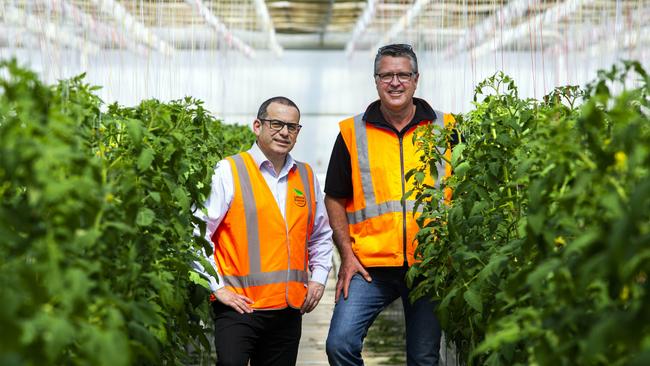
LAMANNA PREMIER GROUP’S GROWTH PLAN
Never-ending rows of hydroponic tomatoes in the vast greenhouse stretch into the distance; more than 80,000 plants that will produce six million trusses of large gourmet tomatoes weighing 2500 tonnes over the current growing season.
These are the big red round tomatoes sold to Coles, Woolies and independent grocers loose and in bags and small packs, many grown under the expansive five hectares of pioneering retractable glass roof at Lancaster, near Shepparton, where the LaManna Premier Group has built its newest tomato facility.
LPG has big plans for another 20 hectares of heated automated greenhouses to be built over the next five years at Lancaster, all growing protected tomatoes and perhaps other vegetables such as eggplants, capsicums and cucumbers hydroponically, heated using a new biomass generator.
Lancaster general manager Mark Daunt says hydroponic tomatoes grown under cover use only a third of the water to produce nearly 10 times as many tomatoes per hectare as those grown in open fields.
The figures prove it. To grow one kilogram of tomatoes in the greenhouse requires 35 litres of water, while in the paddock it needs more than 100 litres. About 50-60 kilograms of fruit is grown per square metre under cover, while on farm a good yield is 6-8kg/sqm.
“As well there is no diesel fuel used (the greenhouse is highly automated using electric robots on travellers between rows), less fertiliser as it is all mixed in with the water that the roots sit in, much less need for any pesticide sprays to control insects, and less risk of losing the crop to hail or frost,” Daunt says. “Most importantly the tomato quality is better and the flavour too.”
It’s a far cry from the earliest days in the 1960s and ’70s, when Anthony Di Pietro’s father, Joe, and mother, Teresa, ran a small wholesale trading business, Viva La Fruit, out of the hectic Footscray wholesale fruit and vegetable markets near the Melbourne docks, selling produce to greengrocers and the restaurant trade.
Citrus, beans, corms, melons, pumpkins and grapes were the mainstay of the business, many grown by Mildura farming mates who had grown up with Di Pietro in his childhood when his family still owned their Buronga farm, prior to the devastating 1956 Murray river floods.
Today the LaManna Premier Group sells and trades nearly $400 million of fruit and vegetables a year. It is the third-largest horticultural trader and farmer in Australia – only the listed Costa group ($1 billion) and Perfection ($600m) are more dominant. LPG is also the biggest owner and operator of coolrooms spread across Australia, to both hold and ripen its own fruit and vegetables ready for distribution to all states, as well as offering a contract service to other big producers.
Its business is now 50 per cent trading fruit and vegetables through the traditional wholesale markets, and the other half purchasing, ripening, selling and distributing fruit and vegetables for the supermarkets.
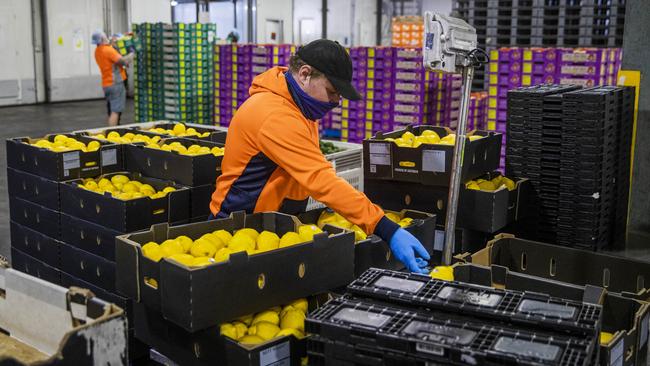
In total, more than 250 million kilograms of fruit and vegetables is purchased or produced every year by the LaManna Premier Group, with 98 per cent sold domestically. But exports are growing, with LPG last year selling 300 containers of fruit and vegetables overseas to more than 15 countries, with plans to ramp up that side of the business.
“Fresh produce and horticulture is a low-margin business so we always want to keep growing our share of the market, through both our own production in-house on our own farms and in partnership with our growers,” says Di Pietro.
“But we can’t hope to continue to grow production and expect it all to be eaten domestically – and this is true of the whole industry – or we run the risk of collapsing markets here, as we have unfortunately seen recently with avocados and strawberries.
“So the focus must be on growing exports and developing new markets for more categories of Australian fresh produce – trying to emulate the success of table grapes and citrus to China if you like – because in the end it will make the whole Australian horticultural industry more successful.”



